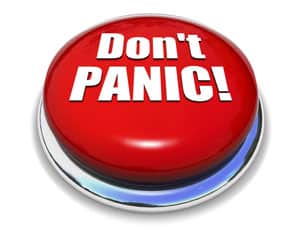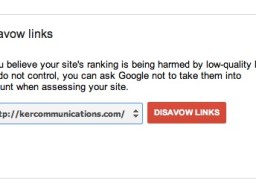One morning you woke up and saw that your website’s organic traffic has gone down, and the site no longer ranks as well as it did for some pretty important search terms. Then you remember that angry comment you read on some blog somewhere about how Google is out to destroy small businesses by penalizing them for no real reason.
In reality, Google has very few penalties and algorithmic spam filters. Unless you know you have been ignoring the Webmaster Guidelines, it is very unlikely that your site is suffering from a penalty. If you read many webmaster or SEO forums or blogs, you might get the impression that Google’s main purpose is to torture the owners of websites by handing out ridiculous penalties for the tiniest of errors. That just isn’t how it is. Those angry folks in the forum are often just venting their frustration about how doing business on the web just isn’t as easy as they thought it would be. Nobody goes to a forum to sing praises – they go to complain. And some of those SEO bloggers happen to make a hefty profit from FUD – Fear Uncertainty and Doubt – about SEO.

If it isn’t a penalty, what is it?!
No parent wants to acknowledge that they may in fact have an ugly baby.
Similarly, no webmaster wants to recognize that they may have a website that is less than perfect.
When a website’s organic search traffic starts to go down, many site operators go into a panic and assume the worst: “It must be a Google penalty!” Then they begin using the Disavow Links Tool to eliminate what they think are “bad” links to the site which must have been the cause. The rankings and traffic continue to plummet because the panic-stricken webmaster has disavowed some links that were not a problem and were actually helping the site rank better. Or maybe they start applying a noindex tag to pieces of perfectly good content, or removing it altogether because they think that is the problem for some reason.
That is kind of like pulling all of the electrical wiring out of your house because a light bulb has burned out – and you didn’t bother changing the lightbulb first!
SEO Crisis Management: Start with Basic Troubleshooting
Don’t Try To Solve A Problem You Don’t Really Have!
Before you sound the alarms and accidentally destroy your website’s rankings in the search results, start with basic troubleshooting.
Over the past few years, I have personally analyzed dozens of supposedly penalized sites. Over half of those really had no penalties at all. What caused the traffic to drop on those sites without penalties? Well, that’s a little complicated sometimes. Some of them had no real decline in site visits, other than a normal seasonal dip. If someone had taken a moment to compare the traffic to the same time period a year ago, they would have seen that there was nothing out of the ordinary. Others had various issues with the website itself, but insisted that it MUST be some kind of penalty – until those problems were fixed and the site bounced back into a better situation than it was in before.
Where to Begin?
First, make sure there is really a significant problem. Moving down one or two positions in the search results for a keyword or two is disheartening, but is quite normal. There could be new competitors, old competitors could be doing a better job of marketing, or maybe Google just changed things up a bit. Organic search traffic is very volatile because there are so many factors outside of Google’s algorithm which can have a significant impact on it. Dropping from number one to number two does not mean your site has been hit with a Google penalty.
If you have confirmed that your traffic is indeed abnormally low all of a sudden, check only your organic traffic in Google Analytics to see when the traffic drop began. Then think about what may have changed on the site anywhere from a day to about a month before the drop. Did someone change your URL structure or remove some key pages leaving behind broken links from other pages? Install or update any Wordpress plugins? Take a good look at the configuration of that “security” plugin. Security plugins often block “bots” which may really be beneficial, and will sometimes even block Google itself from crawling your site.
Is it possible that someone in your organization or at your web hosting company has made some “minor” change that accidentally broke many of the URLs or some other essential part of how the site operates?
Unless you are the best web developer in the world, never make mistake, and nobody else has any possibility of changing even the tiniest part of your website’s infrastructure – take a good long look at your site before assuming it is penalized. Check Google Search Console (formerly known as Webmaster Tools) for any messages, and check Search Console’s Crawl Errors to see if Googlebot is having problems with any part of your site. Rule out the most simple possible explanations like coding errors and other site problems before looking for penalties. After all, you were not doing anything against Google’s rules, were you?
That’s too simple. It can’t possibly be my website!
It is not as exciting to hunt down broken internal links or other website coding accidents as it is to solve the mysteries of Google’s search algorithm. And when your first instinct is to make excuses to your boss or even yourself, it is a lot easier to blame someone or something other than your own website or your own work. But the most simple explanation is often the most true. Whether the site is penalized or just suffering from lower than normal traffic for some other reason, if you have not made completely sure without a shadow of a doubt that your site is 100% perfect (or very close to it), you may be overlooking a face-palmingly easy solution. Where it becomes less simple is when you only think it is perfect – but you don’t know what you don’t know. It’s OK to not be all-knowing. It is not OK to think you are.
It’s OK to ask for help.
Nobody is perfect. For some reason, many of us have this notion that everything on the internet is easy, and everything does what we expect it to do. When things go wrong, it is easy to jump to the conclusion that it must be someone else’s fault because we are all experts at everything because we read something about it somewhere. When it comes to SEO, nothing could be further from the truth. Even the most experienced and knowledgeable SEO is going to get blindsided once in a while – even when they do this stuff all day every day. If you read a few articles and are now an SEO expert, no offense, but you could be your own worst enemy.
When that search engine traffic problem comes along that you just can’t figure out, it is time to seek help. Get another set of eyes on the problem, preferably someone who does know SEO inside and out and has no emotional attachment to the site or your business.
Ker Communications can objectively and accurately diagnose the cause of your website’s traffic problems – without the FUD. Learn more about our traffic drop diagnosis services here. We also do SEO Audits which can help you improve your search engine visibility, and may help you sleep better.




